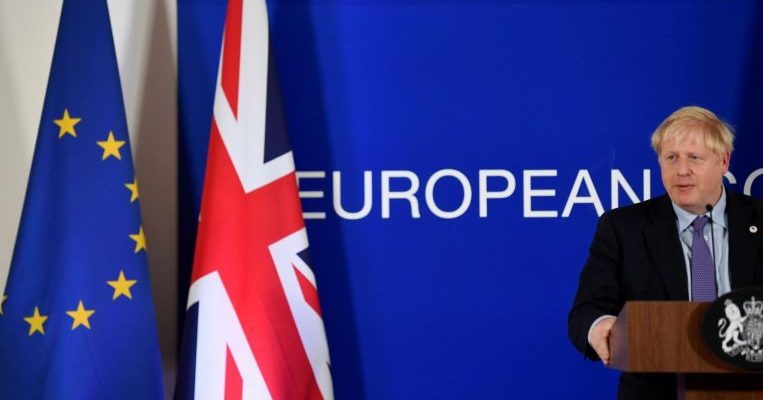
After years of noisy domestic and international disputes over its membership in the European Union, Britain on Friday at 11pm (7am yesterday, Singapore time) – not with a bang, but with a whimper.
The buildings of major government departments in London were lit up and a huge countdown clock was projected on the facade of the historic residence of British prime ministers at 10 Downing Street.
But the bells of Big Ben did not chime, since the iconic clock is currently undergoing repairs; a recording of its gongs was played out over loudspeakers. And the few thousand noisy flag-waving revellers gathered in the centre of the British capital to mark the moment of their country’s separation from the EU dispersed quietly after a few rounds of singing Britain’s national anthem.
For on both sides of the channel, there is a realisation that the time for emotions is over; the next few months are all going to be about hard trade negotiations and brinkmanship.
The starting point for the negotiations is the so-called “Political Declaration” signed by British Prime Minister Boris Johnson and the leaders of the 27 remaining EU member-states last October, which pledges both sides to work for the creation of “an ambitious, broad, deep and flexible partnership across trade and economic cooperation with a comprehensive and balanced Free Trade Agreement at its core”.
However, there is no agreement over what this actually means. Mr Johnson claims to be interested in concluding a deal which would allow for the free flow of manufactured goods, while still permitting Britain to have its own laws and regulations on services such as insurance and investments.
That plays up to the strengths of the British, where services account for around 80 per cent of gross domestic product. And it is particularly important for the City of London, by far Europe’s biggest financial centre; it alone exports around £65 billion (S$117 billion) worth of financial and legal services to the EU each year.
However, the prospect of a nimbler Britain able to undercut Europe on tax and regulations over environmental or labour standards spooks German Chancellor Angela Merkel. Over the past few months, she has frequently warned about the fact that Europe “will have an economic competitor at our door, even if we want to keep close economic, foreign and security cooperation and friendly relations”.
What EU negotiators want instead is what is called by bureaucrats a “level playing field”, which means that Britain undertakes to respect a broadly similar framework of regulations to that applying to businesses in Europe.
And some German and French politicians go even further by insisting that Britain should accept in its future trade deal with Europe a principle of a “dynamic alignment”, which is bureaucratic language for a British undertaking to accept future regulations Europe may adopt.
The British reject all this, arguing instead that the whole point of leaving the EU was to regain their freedom to regulate their economy, and particularly their service industries. EU negotiators have hinted at a potential compromise, under which Britain’s financial sector could continue to have access to European markets in return for EU access to Britain’s rich fishing grounds.
The issue is important for Europe since the majority of the EU’s current fish catch is made in the northern waters of the Atlantic, of which British waters are a crucial part. Yet Mr Johnson insists that Britain will retain full jurisdiction over its “spectacular maritime wealth”.
But the biggest problem may be the short time available to British and EU negotiators to conclude such complicated deals. Under existing arrangements, all the treaties must be concluded by the end of the year, and the British government is adamant there would be no extensions to the negotiations.
With actual talks beginning only early next month, both sides are now playing tough. “We are planning full checks on all EU imports – export declarations, security declarations, animal health checks…”, an unnamed senior British official told the media over the weekend, hinting at the possibility that Britain is sanguine about not getting any trade deal.
Meanwhile, Dr Ursula von der Leyen, president of the European Commission, the EU’s executive body, indirectly warned Mr Johnson that Britain will face the united might of 27 EU member-states in these negotiations.
“Our experience has taught us that strength does not lie in splendid isolation, but in our unique union,” said Dr von der Leyen.
